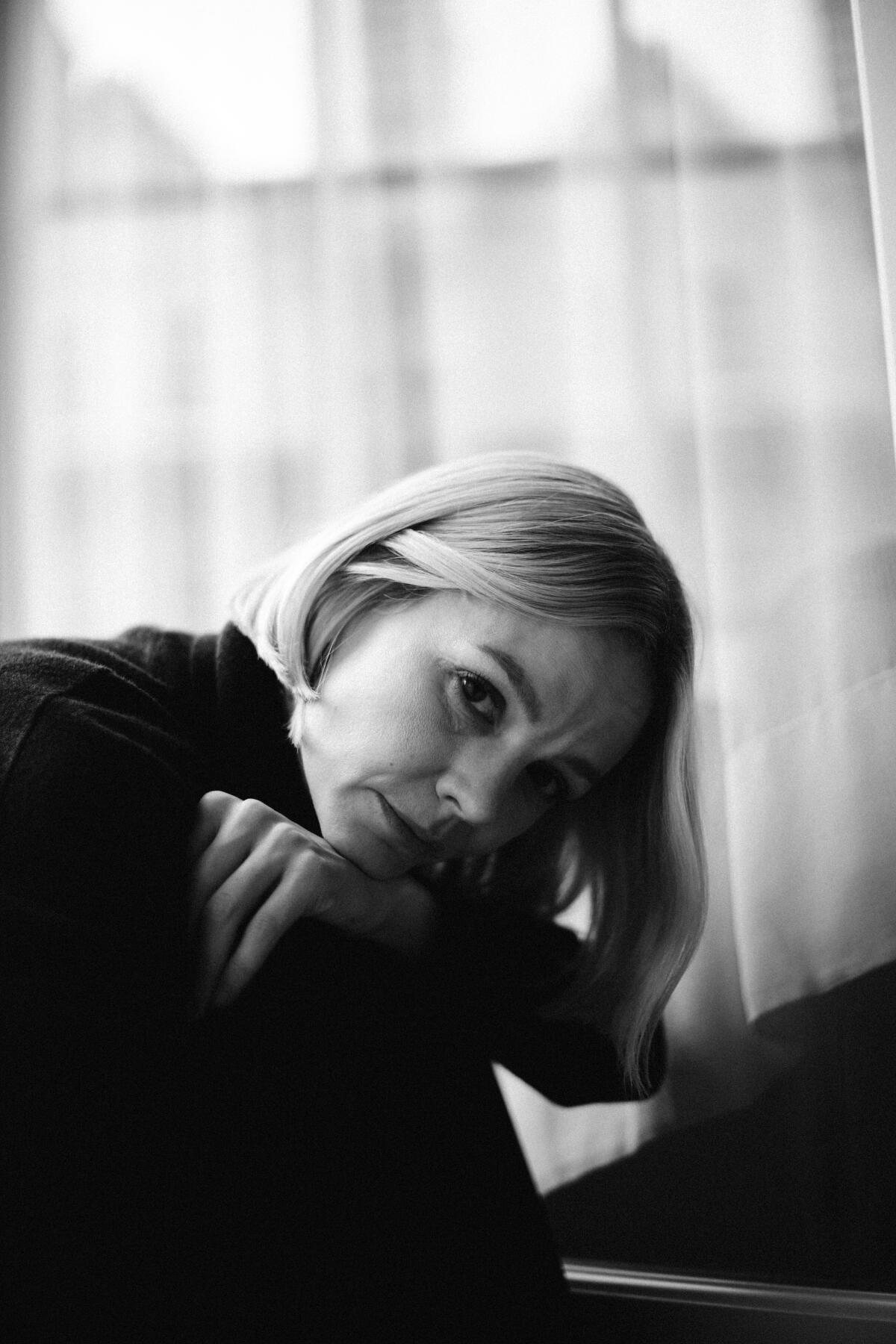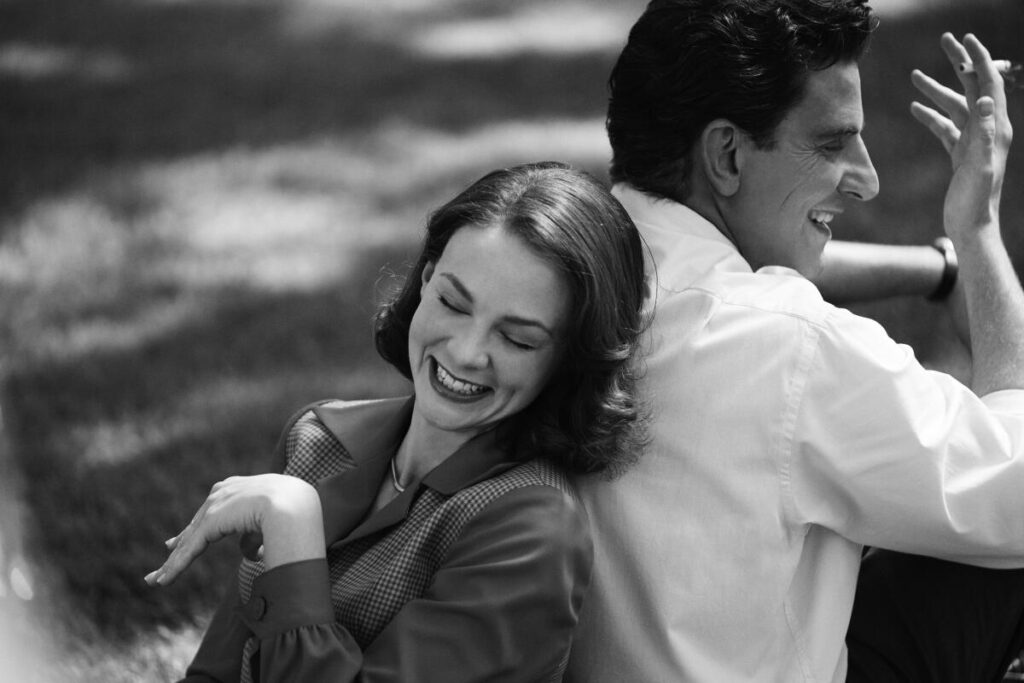Back in 2018, Bradley Cooper pitched “Maestro” to Carey Mulligan over coffee at Manhattan’s Cafe Cluny. The film, which he would direct, co-write, produce and star in was about Leonard Bernstein, the legendary conductor-composer who was married to a woman but often had affairs with men.
Cooper wanted Mulligan to play Bernstein’s actor-painter spouse, Felicia Montealegre. Over Zoom from London, Mulligan recalls her concern that day. “I knew very little about Leonard Bernstein and nothing about her,” Mulligan says. “But he was like, ‘This is not going to be the story of the great man with a wife. This is going to be about their relationship, about their marriage.’”
She was onboard.
The immediacy of her decision may have been helped along by an impactful meeting just days earlier. Mulligan had been on stage performing the one-person drama “Girls & Boys” when a heavy piece of the set fell on her head. “I carried on with the show,” says Mulligan, who waited until after her final bow to retreat to her dressing room and, fearing she’d sustained a life-threatening head injury, collapsed crying on the floor.
That was when she was informed that Cooper was backstage hoping to say hello. “He found me in pieces,” says Mulligan, who recalls how after examining her, Cooper hustled her off to urgent care. She’d had a concussion, and in the aftermath, a bit of insight. “We had a kind of dramatic bonding moment, in retrospect,” she says.
Her faith in Cooper’s tenderness and support generated by that interaction turned out to be key. Based on the research he’d done on the real-life Felicia, Cooper was positive Mulligan was perfect for the part, he says in a phone call. “She just looked so much like Carey and just the way [Carey] spoke and moved, I thought, ‘Well, Carey could really inhabit this person,’ ” Cooper says. “It was just always so clear right from the beginning.” But rather than casting Mulligan as Felicia, then leaving her to her own devices regarding preparation, he told her in that first conversation that he expected her to join him in his own immersive, often unusual approach to acting.
“I felt like he was sort of wanting to really challenge me as an actor, but I think he also wanted a partner in the whole process,” says Mulligan, who at 18 applied for and was rejected by a series of drama schools and despite her critically acclaimed performances on stage and film is largely self-taught. She admits to having trouble picturing the journey she was about to embark on. “I don’t think I knew the specifics — and it was the specifics that sort of unnerved me as we got into the process.”
“I felt like he was sort of wanting to really challenge me as an actor, but I think he also wanted a partner in the whole process,” Carey Mulligan says of Bradley Cooper.
(Jason McDonald / Netflix)
In interviews, Mulligan likes to laugh about how years before filming began, she’d be tucking her children into bed, her mobile phone would ring and on the other end of the line was Cooper, already in character, speaking in Bernstein’s commanding New York baritone. And she can point to a foundational experience: In 2019, Mulligan and Cooper spent several days together rehearsing with singers and musicians and ultimately narrating the Philadelphia Orchestra’s staging of the Leonard Bernstein operetta “Candide” at the Kimmel Center for Performing Arts. “The adrenaline of sharing the performance together was kind of building blocks for the final film,” she says.
To pick up her character’s elegant mid-Atlantic accent, one forged by Felicia being born in Costa Rica, raised in Santiago, Chile, and a frequent vacationer in the United States, the British actor listened obsessively to whatever of Felicia’s recorded interviews she could find, of which, according to Jamie Bernstein, the eldest of the three Bernstein offspring, few existed.
“She had so much less to go on than Bradley did for his preparation to portray our dad. [Bradley] had endless amounts of video and writing and photography, just endless resources,” says Bernstein, who along with her siblings tried to make up for the inequities, offering Mulligan their mother’s gold-plated engraved cigarette lighter, one of her dresses and a light shawl. They also, via Zoom conversations in which they appeared together, sought to help Mulligan understand that despite their mother’s impeccably stylish look or willingness to let her attention-happy husband take center stage, Felicia was “the engine of our family as a unit.”

“I just got this enormous sense of them not just loving her, but really liking her so much,” Carey Mulligan says of talking to the children of Leonard Bernstein and Felicia Montealegre about their mother.
(Jennifer McCord / For The Times)
“I just got this enormous sense of them not just loving her, but really liking her so much — and that that was the same for anyone who encountered her, says Mulligan, who found that speaking to Felicia and Leonard’s children offered a glimpse into the Bernstein family energy. “It was chaos, the three of them all overlapping, the anecdotes. It was like, ‘Whoa.’ I’d started quite diligently trying to take notes at the beginning. And then after a while, I was just like, ‘I can’t write that fast.’ ”
The most challenging hoop she was asked to jump through, however, was a soul-baring week-long dream workshop with Cooper that culminated in Mulligan writing and staging what she calls “essentially a piece of performance art,” set to some of her favorite music. “To do it for one other person and to invent it? That was just the scariest thing I’ve ever done, more terrifying than anything,” Mulligan says. “I was unbelievably emotional. But then you’ve sobbed in front of someone and told them all your secrets.
“I think that when you’re doing a film about a marriage, people who sort of give their lives to one another, you can’t act that. That’s the kind of history you have to feel is just there, the weighty history of people who’ve shared a bed or not shared a bed. It’s got to feel like these people are each other’s second skin. And I think that whatever happened by the end, that was it. From then on, it was just honestly a complete blast.”
Though Mulligan has been directed many times by other actors, appearing in a scene with someone who is simultaneously reciting dialogue and directing was a first for her. Cooper regularly used hand signals with the sound mixer and camera operator. Often Mulligan would walk on set and realize that the cameras were already rolling. Halfway during a wrenching scene in a doctor’s office, when Cooper decided to change how he wanted the moment shot, Mulligan recalls how instead of calling cut, he just spoke to the dolly grip as Mulligan sobbed on his shoulder. “You can’t see his mouth, [but] he’s saying, ‘Mango, come in, don’t push out,’ ” Mulligan says.
“But it was the weirdest thing. Rather than throwing me [off], it was weirdly comforting. I loved the sense of us all being one thing. Like Mango, the dolly grip, suddenly became part of the scene in a way. And that would happen all the time. If you couldn’t see his face [in the shot], he was probably either improvising, throwing stuff in to elicit a different response from you, or talking to the crew.”

“I know myself as an actor and what I want to be challenged by,” Carey Mulligan says of her 20 years in the business.
(Jennifer McCord / For The Times)
The first time the Bernstein siblings saw “Maestro” in its final form was when it premiered at the Venice International Film Festival. According to Jamie Bernstein, she, her sister and their brother likened Mulligan’s ability to evoke their mother to “a magic trick.” “It made us gasp sometimes. She just kind of vibed it. We were amazed how she was able to evoke our mother’s very unusual combination of strength, confidence and this innate fragility. That was the way our mother was, and Carey was able to portray that so accurately and movingly.”
While on press tour for “Maestro,” Mulligan has been repeatedly asked if she’s been made a convert to Cooper’s approach to acting. Last summer, she spent a couple of weeks filming “One for the Money,” a comedy starring British funnymen Tom Basden and Tim Key. “I did not do a dream workshop for that,” she deadpans. “I just basically was entertained by two comedians.” Then she adds, “But [“Maestro”] enormously informed how I work.”
Just as important, she says, is the fact that it recently occurred to her she’s no longer brand-new to the job, that she’s been a professional actor for two decades. “I don’t feel cocky, but I feel more sure of myself now,” she says. “Like, I know myself as an actor and what I want to be challenged by.”

